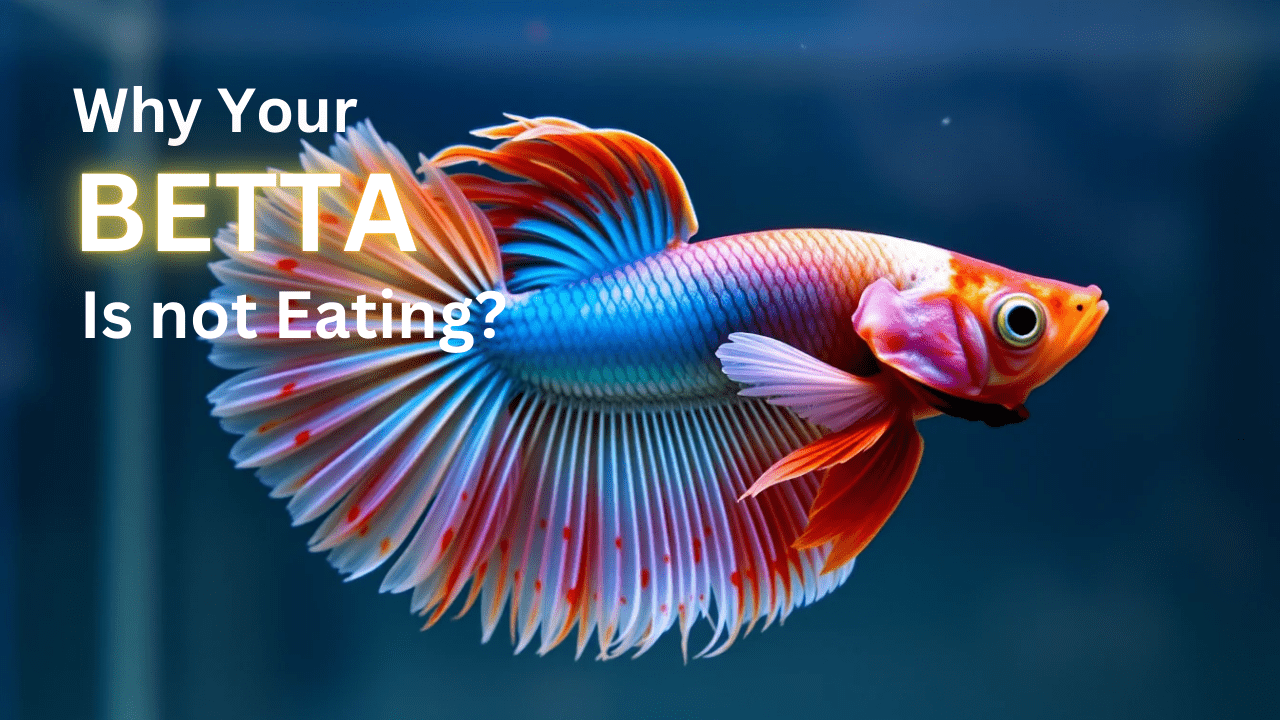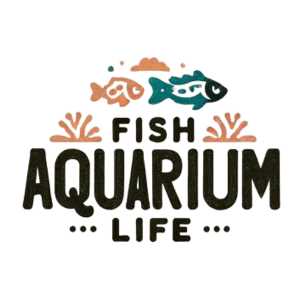If your betta fish is not eating, it can be a common issue that worries many betta owners. I’ve dealt with this myself, and thankfully, there are a few things you can do before you need to ask for help from a veterinarian. First, it’s important to investigate the possible causes, as most of them relate to inappropriate husbandry—in other words, how well you care for your fish. Sometimes, even small changes in water quality, diet, or tank setup can considerably improve your fish’s appetite.

Making these adjustments as soon as possible can increase the chances of your betta’s appetite returning to normal. So, before assuming the worst, take a step back and see if anything in the environment needs fixing
In this article, we will explore the possible reasons why your betta fish is not eating and discuss effective treatments to help restore its appetite.
Why Is Your Betta Fish Refusing to Eat?
There are several reasons why your betta fish may not be eating, and in some cases, it could be due to a combination of these factors.
1.Water Quality
When fish live in poor water quality, they become stressed and weak. Unlike other pets, they cannot escape their environment, and some even jump out of the tank or bowl when trying to avoid constant exposure to bad conditions. The results of this are severe—chronic stress puts their immune system into overload, making them feel unwell. This leads to lower body function, weakens their reproductive effort, slows growth, and causes a reduced appetite.
Thankfully, fixing water conditions is one of the easiest ways to help. Move your betta out of an antiquated bowl and into a 5- to 10-gallon heated, filtered aquarium. It’s crucial to test the water regularly using a liquid-based kit and perform routine maintenance to keep water parameters within normal ranges for a happy, healthy betta.
2.Low-Quality Food
A betta may a refuse to finish its food if it becomes stale or loses its nutritional value over time. Many fish foods lose essential vitamin content, including vitamin C, within six months. Once opened repeatedly every day, the food starts to go bad, affecting its smell, which bettas rely on to locate meals. If the food does not smell good, your betta may ignore it. To keep your betta’s health in check, feed a fresh pelleted diet that is replaced at least twice a year.
Offer two to three times per day, using the pellet sizes that can fit within one of your fish’s eyeballs. Feeding expired food for too long can have serious consequences, weakening the immune-boosting properties of vitamin E and making your betta significantly prone to secondary infections from the surrounding environment.
3.Overfeeding
Some bettas have eyes bigger than their stomachs and will happily consume all the morsels in their tank, which makes it important to monitor how much food they’re getting. If their metabolism can’t keep up, the food starts to back up, leading to serious gastrointestinal distress. An overfed betta may present with a severely distended belly and will need help ASAP.
To prevent this, any uneaten food that remains at the bottom of the aquarium should be removed using a net or gravel vacuum before it creates further problems.
4.Inappropriate Temperature
Bettas are tropical fish that need a heater in their tank to stay healthy. As ectotherms, their metabolism and immune function are dependent on their surrounding environmental temperature. Each species has a sweet spot for temperature ranges, and bettas need heat between 78 to 82 degrees Fahrenheit (25 to 28 Celsius) for optimal health. Always use a commercial aquarium heater designed for the size of your tank, ensuring it isn’t too big for the small volume of water.
A submerged thermometer will help check its function. If the water is too cold, your betta won’t digest its meal properly, leading to impaction in the gastrointestinal (GI) tract, where food fills up and cannot exit. An affected fish may present with a severely distended belly and might need to be seen by an aquatic veterinarian.
5.Competition
Betta fish are notorious for viciously defending their territory, making them highly territorial creatures. Male bettas should never be kept together or even within sight of each other. While some female bettas can be less aggressive, their behavior varies depending on their individual temperament. If a betta is too concerned about its tankmates, it can easily become stressed and eventually stop eating.
6.Illness and Disease
Even with the best care and proper housing, your betta can still fall ill. If you’ve checked everything and still can’t figure out what’s wrong, it’s time to call a professional. Look for serious signs of illness, such as lethargy, a change in color, rips or tears in the fins, or even pine-coning of the scales. The sooner you get your betta help, the better the prognosis will be.
Finding the Right Feeding Amount
How much to feed your betta fish can vary depending on its size, gender, and age. There are a few methods to estimate the right amount of food they should be getting. If feeding pellet food, think about how many pellets could roughly fit into one of your betta’s eyeballs—this is approximately the correct portion per day. Another method is to add food to the tank and wait 5 minutes to check how much has been eaten.
As a general rule of thumb, whatever your fish eats within those 5 minutes is a good amount. If neither of these options appeal to you, offering a total of 7-8 pellets per day works well for most bettas to eat.
Best Feeding Schedule for Your Betta
It’s recommended to feed your betta fish twice a day, once in the morning and once in the evening. This helps them digest food better and can add extra enrichment to their routine. However, their dietary needs can also be met with just one feeding per day. Regardless, they should receive the same total food each day.
For example, if you give them 4 pellets in the morning and 4 at evening, it equals 8 pellets in total. If you plan to supplement their diet with treats like live or frozen food, do so no more than 1-2 times per week. Some owners practice fasting by skipping food for 24 hrs every two weeks, allowing the GI tract to clear and helping to prevent bloating. If you choose to fast your betta, it should never last beyond 48 hours.
Related: humans food betta fish can eat?
How Long Can Your Betta Survive Without Food?
Technically, a betta can go without food for 10-14 days, but it’s not recommended to fast your fish for that long. When left unfed for an extended period, your betta is apt to become stressed, leading to a slew of further health problems that may affect its lifespan. You should also consider how leaving a betta for so long might impact the aquarium water. Without proper maintenance, the tank could become dirty, harming your fish’s optimal health. To be safe, avoid going more than 2 days without feeding. If you need to be away for 3 or more days, think about hiring a sitter, using an automatic feeder, or buying feeding blocks to keep your betta fed while you’re gone.
For details, read this: How Long Can Your Betta Survive Without Food?
Steps to Take When Your Betta Stops Eating
First, determine the reason behind your betta fish’s refusal to eat. Diet and overfeeding are often to blame, so try modifications in when, what, and how much you feed them. If you’re certain that’s not the cause, test the tank water and temperature and adjust them accordingly to keep them within the correct parameters.
Also, check for changes in color, damaged fins, or odd behavior, as these could be signs of sickness. Once you’ve cleared all potential issues, consider stress as a problem. Ask yourself: Have I made recent changes or introduced my betta to a new environment? Could mates, too much light, or not enough hiding spots be the issue?
If possible, remove the stressor and continue regularly feeding. A special note: Some bettas stop eating while breeding. If this happens, provide normal feedings and give treats like frozen or live bloodworms to encourage them to eat food.
How to Treat a Betta That Won’t Eat
If you notice your betta is not eating, the first step is to test the water chemistry. If any parameters are off, especially the temperature, take steps to correct it as soon as possible. Be cautious—changes in pH or temperature should take place slowly to avoid shock to your fish. If water quality is within the normal range, assess the diet. When did you buy the food? Does it look and smell like it did first when you bought it? If the food seems suspicious or old, it should be replaced. Once you’ve ruled out environmental or dietary causes, call an aquatic veterinarian for additional guidance and diagnostics.
Ensuring a Healthy Betta
The best method to ensure a happy and healthy betta is to house them in a heated, filtered aquarium, keep their water chemistry within range, and feed them appropriately. If you have concerns about their health or husbandry, contact your local aquatic veterinarian for guidance.
FAQs
What do I do if my betta fish won’t eat?
If your betta fish refuses to eat, medication won’t help, and recovery becomes unlikely. Try offering live or fresh frozen (not freeze-dried) brine shrimp, daphnia, or bloodworms, which many bettas see as treats. You can also experiment with small pieces of cooked shrimp, oyster, or beef heart from the grocery store.
How long can a betta go without eating?
A betta fish can go without food for up to 14 days. Missing a meal or two isn’t a cause for concern. Various factors could be behind your betta’s lack of appetite.
How can I make my betta fish eat?
Tap the water, and when your betta comes to the feeding spot, drop a pellet in. Repeat this process to establish a routine. If your betta struggles to find food, try using a pipette to feed frozen foods—many enjoy snatching food directly from it.
Conclusion
There are several reasons why your betta fish might not be eating, and finding the cause is critical to solving the issue. In many cases, a simple change in its diet or treating the water with a conditioner can encourage your fish to start eating again.
However, if your betta refuses food for two weeks, a serious issue could be the cause. If all home treatments have failed, seeking help from an experienced vet is the best step forward.
Lastly, ensure your betta has plenty of hiding spots and compatible plants in its tank for a happy and fulfilled life!
Also read for extra betta care!
